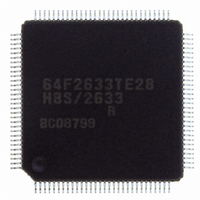HD64F2633RTE28 Renesas Electronics America, HD64F2633RTE28 Datasheet - Page 49

HD64F2633RTE28
Manufacturer Part Number
HD64F2633RTE28
Description
IC H8S MCU FLASH 256K 120-TQFP
Manufacturer
Renesas Electronics America
Series
H8® H8S/2600r
Datasheet
1.D12312SVTE25V.pdf
(341 pages)
Specifications of HD64F2633RTE28
Core Processor
H8S/2600
Core Size
16-Bit
Speed
28MHz
Connectivity
I²C, IrDA, SCI, SmartCard
Peripherals
DMA, POR, PWM, WDT
Number Of I /o
73
Program Memory Size
256KB (256K x 8)
Program Memory Type
FLASH
Ram Size
16K x 8
Voltage - Supply (vcc/vdd)
3 V ~ 3.6 V
Data Converters
A/D 16x10b; D/A 4x8b
Oscillator Type
Internal
Operating Temperature
-20°C ~ 75°C
Package / Case
120-TQFP, 120-VQFP
Lead Free Status / RoHS Status
Contains lead / RoHS non-compliant
Eeprom Size
-
Available stocks
Company
Part Number
Manufacturer
Quantity
Price
Company:
Part Number:
HD64F2633RTE28V
Manufacturer:
RENESAS
Quantity:
296
Company:
Part Number:
HD64F2633RTE28V
Manufacturer:
RENESAS
Quantity:
784
- Current page: 49 of 341
- Download datasheet (2Mb)
1.7
(1) Addressing Modes
The CPUs support the eight addressing modes listed in table 1.4. Each instruction uses a subset of
these addressing modes. Arithmetic and logic instructions can use the register direct and
immediate modes. Data transfer instructions can use all addressing modes except program-counter
relative and memory indirect. Bit manipulation instructions use register direct, register indirect, or
absolute addressing mode to specify an operand, and register direct (BSET, BCLR, BNOT, and
BTST instructions) or immediate (3-bit) addressing mode to specify a bit number in the operand.
Table 1.4
1. Register Direct—Rn: The register field of the instruction specifies an 8-, 16-, or 32-bit general
register containing the operand. R0H to R7H and R0L to R7L can be specified as 8-bit registers.
R0 to R7 and E0 to E7 can be specified as 16-bit registers. ER0 to ER7 can be specified as 32-bit
registers.
2. Register Indirect—@ERn: The register field of the instruction code specifies an address
register (ERn) which contains the address of the operand in memory. If the address is a program
instruction address, the lower 24 bits are valid and the upper 8 bits are all assumed to be 0 (H'00).
3. Register Indirect with Displacement—@(d:16, ERn) or @(d:32, ERn): A 16-bit or 32-bit
displacement contained in the instruction is added to an address register (ERn) specified by the
register field of the instruction, and the sum gives the address of a memory operand. A 16-bit
displacement is sign-extended when added.
No.
1
2
3
4
5
6
7
8
Addressing Modes and Effective Address Calculation
Addressing Mode
Register direct
Register indirect
Register indirect with displacement
Register indirect with post-increment
Register indirect with pre-decrement
Absolute address
Immediate
Program-counter relative
Memory indirect
Addressing Modes
Rev. 4.00 Feb 24, 2006 page 33 of 322
@(d:16,ERn)/@(d:32,ERn)
Symbol
Rn
@ERn
@ERn+
@–ERn
@aa:8/@aa:16/@aa:24/@aa:32
#xx:8/#xx:16/#xx:32
@(d:8,PC)/@(d:16,PC)
@@aa:8
REJ09B0139-0400
Section 1 CPU
Related parts for HD64F2633RTE28
Image
Part Number
Description
Manufacturer
Datasheet
Request
R

Part Number:
Description:
KIT STARTER FOR M16C/29
Manufacturer:
Renesas Electronics America
Datasheet:

Part Number:
Description:
KIT STARTER FOR R8C/2D
Manufacturer:
Renesas Electronics America
Datasheet:

Part Number:
Description:
R0K33062P STARTER KIT
Manufacturer:
Renesas Electronics America
Datasheet:

Part Number:
Description:
KIT STARTER FOR R8C/23 E8A
Manufacturer:
Renesas Electronics America
Datasheet:

Part Number:
Description:
KIT STARTER FOR R8C/25
Manufacturer:
Renesas Electronics America
Datasheet:

Part Number:
Description:
KIT STARTER H8S2456 SHARPE DSPLY
Manufacturer:
Renesas Electronics America
Datasheet:

Part Number:
Description:
KIT STARTER FOR R8C38C
Manufacturer:
Renesas Electronics America
Datasheet:

Part Number:
Description:
KIT STARTER FOR R8C35C
Manufacturer:
Renesas Electronics America
Datasheet:

Part Number:
Description:
KIT STARTER FOR R8CL3AC+LCD APPS
Manufacturer:
Renesas Electronics America
Datasheet:

Part Number:
Description:
KIT STARTER FOR RX610
Manufacturer:
Renesas Electronics America
Datasheet:

Part Number:
Description:
KIT STARTER FOR R32C/118
Manufacturer:
Renesas Electronics America
Datasheet:

Part Number:
Description:
KIT DEV RSK-R8C/26-29
Manufacturer:
Renesas Electronics America
Datasheet:

Part Number:
Description:
KIT STARTER FOR SH7124
Manufacturer:
Renesas Electronics America
Datasheet:

Part Number:
Description:
KIT STARTER FOR H8SX/1622
Manufacturer:
Renesas Electronics America
Datasheet:

Part Number:
Description:
KIT DEV FOR SH7203
Manufacturer:
Renesas Electronics America
Datasheet:











